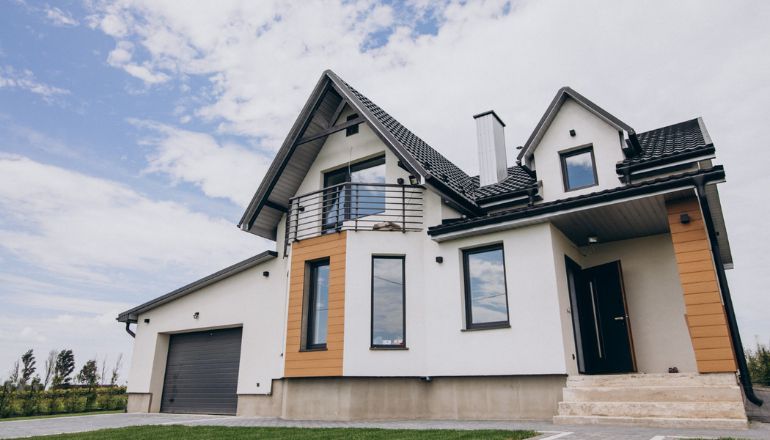Duplex vs Condo: Pros, Cons, and Key Differences

The choice between a duplex vs condo goes far beyond architecture and it reflects how you want to live, spend, and grow your investment. Are you looking for more privacy and potential rental income, or do you prefer convenience and low-maintenance living?
This guide walks you through the core differences, pros and cons, and investment potential of each option so you can confidently decide which type of property fits your lifestyle and financial goals best.
What is a Duplex?
A duplex is a residential building divided into two separate living units, typically side-by-side or stacked vertically. Each unit has its own entrance, kitchen, bathroom, and living space, making it feel like a standalone home. Duplexes are often owned by a single person who may choose to live in one unit and rent out the other, or rent both units for passive income.
Duplexes are popular in suburban neighborhoods and can offer more privacy and space compared to apartments or condos. While they resemble single-family homes in many ways, the presence of a shared wall and sometimes shared utilities sets them apart.
What is a Condo?
A condo, short for condominium, is a privately owned unit within a larger residential building or complex. Unlike a duplex, where the owner might control the entire structure, condo owners only own the interior of their individual units. The exterior and shared spaces—like hallways, lobbies, gyms, and pools—are jointly owned and maintained by a homeowners association (HOA).
Condos are especially common in urban areas where space is limited and high-rise living is the norm. They’re ideal for people who want to own property but prefer a low-maintenance lifestyle, as the HOA typically handles tasks like landscaping, exterior repairs, and snow removal. However, owners must also pay monthly HOA fees and follow the association’s rules.
Duplex vs Condo: Major Differences
When comparing a duplex vs condo, the differences go beyond just the building structure and they affect lifestyle, ownership responsibilities, and long-term costs.
- Ownership Structure: In a duplex, the owner usually owns both units and the land, while in a condo, ownership is limited to the interior space of the unit. Common areas in a condo are co-owned and managed by the HOA.
- Privacy and Space: Duplexes typically offer more privacy, often with separate entrances and yards. Condos, on the other hand, share walls with multiple units and usually have limited outdoor space.
- Maintenance: Duplex owners are responsible for all maintenance, including the roof, yard, and exterior. Condo owners only manage interior upkeep, while the HOA handles shared areas and exterior maintenance.
- Cost and Fees: Condos often come with lower purchase prices but include ongoing HOA fees. Duplexes may be more expensive upfront but offer income potential if one unit is rented out.
- Rules and Flexibility: Condo living usually involves strict HOA rules. In contrast, duplex owners enjoy more freedom regarding renovations, rentals, and usage—especially if they own both units.
Pros and Cons of Living in a Duplex
Living in a duplex offers a unique mix of independence and shared space. Before deciding if it’s the right fit for you, it’s important to weigh both the advantages and potential drawbacks.
Advantages of a Duplex
A duplex can feel like a single-family home while offering added benefits like income potential and more control over your living environment.
- Increased Privacy: With a duplex, you often have your own private entrance and separate living spaces, giving you more privacy compared to apartments or condos.
- Potential for Rental Income: If you live in one unit and rent out the other, a duplex can provide an additional stream of income, helping with mortgage payments.
- More Space: Duplexes generally offer more square footage than condos, including larger living areas and sometimes a private yard, making them ideal for families or those who need extra space.
- Customization: As an owner of a duplex, you have more control over modifications and upgrades to the property, both inside and out.
Downsides of a Duplex
Despite the perks, living in a duplex comes with added responsibilities and some trade-offs that may not suit everyone.
- Higher Maintenance Responsibilities: Unlike condos, where the HOA handles maintenance, duplex owners are responsible for the upkeep of both the interior and exterior, including the yard and shared walls.
- Higher Upfront Cost: Duplexes tend to be more expensive than condos in terms of both purchase price and property taxes, which may make them less affordable for some buyers.
- Potential for Noise: Even though duplexes offer more privacy than apartments, noise can still be an issue if the units share a wall, especially if the neighbors are loud or have different schedules.
- Limited Control Over Neighbors: If you’re renting out the other unit, you have less control over the tenant’s behavior or upkeep of the property, which can sometimes lead to conflicts.
Pros and Cons of Living in a Condo
Condos offer a more hands-off lifestyle and are especially popular in urban areas. Here’s a look at the main pros and cons to help you decide if condo living suits your needs.
Advantages of a Condo
Condos are a great option for those seeking ownership without the full responsibility of maintaining a standalone home.
- Low Maintenance: The HOA typically takes care of exterior upkeep, landscaping, and common areas, reducing your personal maintenance burden.
- Amenities: Many condo complexes include features like gyms, pools, lounges, and security services that aren’t usually available with duplexes or single-family homes.
- Affordability: Condos can be more affordable than duplexes, especially in high-demand cities, offering a way to own property with a lower entry cost.
- Community Environment: Living in a condo often means being part of a close-knit community, which can be appealing for social individuals or those who value security.
Downsides of a Condo
While convenient, condos come with limitations that may not fit everyone’s lifestyle.
- Monthly HOA Fees: Condo owners must pay regular homeowners association fees, which can vary widely and add to long-term costs.
- Less Privacy: Shared walls, common hallways, and close neighbors can mean more noise and less personal space compared to a duplex or house.
- Rules and Restrictions: HOA guidelines may limit your ability to renovate, rent out your unit, or even keep pets, depending on the complex.
- Limited Outdoor Space: Most condos offer little to no private yard, which can be a drawback for families or pet owners.
Duplex vs Condo Investment Potential
When considering duplex vs condo from an investment standpoint, both options have their strengths, but the right choice depends on your financial goals, risk tolerance, and long-term plans.
Rental Income Opportunities
Duplexes generally offer stronger rental income potential, especially if you own both units. You can live in one unit and rent out the other, effectively reducing or even covering your mortgage. This setup is ideal for first-time investors who want to ease into property management while still generating steady cash flow.
Condos, on the other hand, can also be rented out, often more easily in dense urban markets where demand for smaller, more affordable housing is high. However, many condo associations limit or restrict rentals, so it’s crucial to review the HOA rules before purchasing for investment purposes.
Resale Value and Demand
Resale trends vary by market, but duplexes tend to appreciate well in areas where multi-family housing is in demand. They attract a mix of owner-occupants and investors, which can expand your pool of potential buyers. Plus, the dual-income potential often boosts long-term value.
Condos, while typically slower to appreciate than duplexes, remain a popular choice in city centers where location and amenities matter most. They’re appealing to young professionals, retirees, and buyers seeking lower maintenance—making them easier to sell in the right market conditions.Still deciding between property types? Don’t miss our guide on Condo vs. Townhouse, which breaks down another key comparison to help you choose the best fit for your lifestyle and investment goals.













